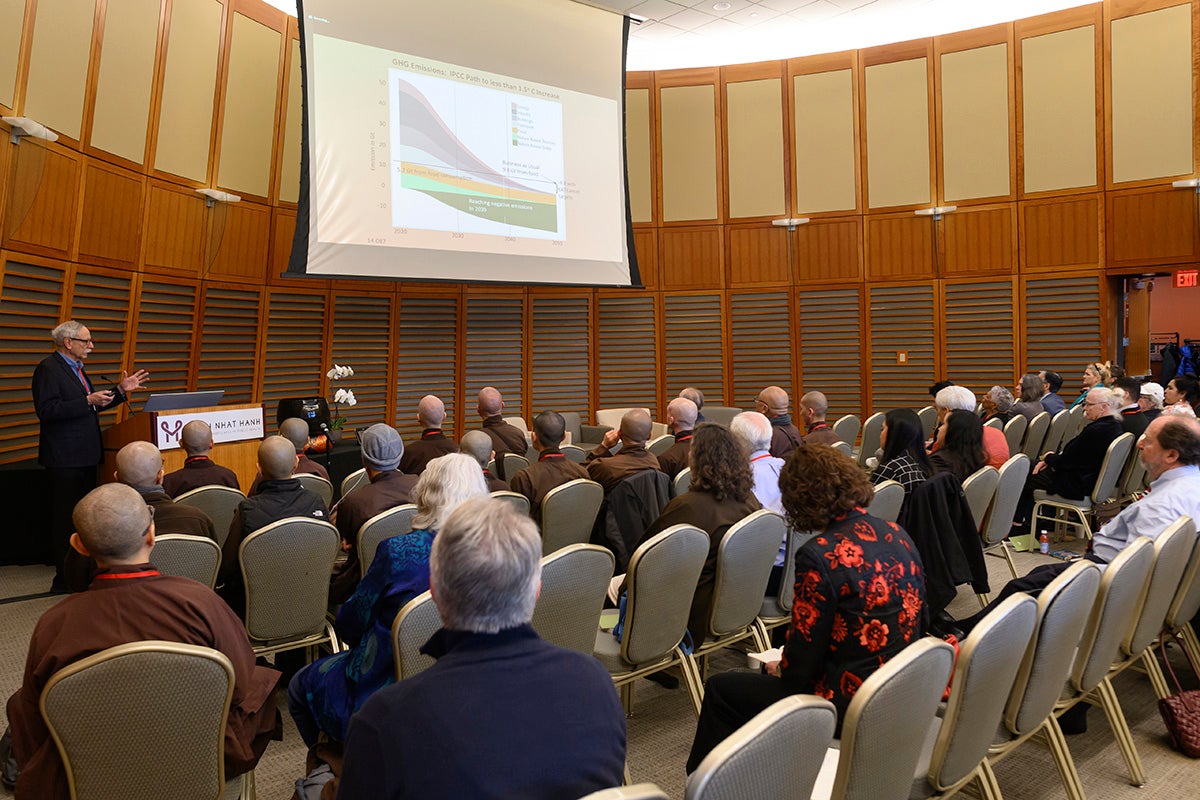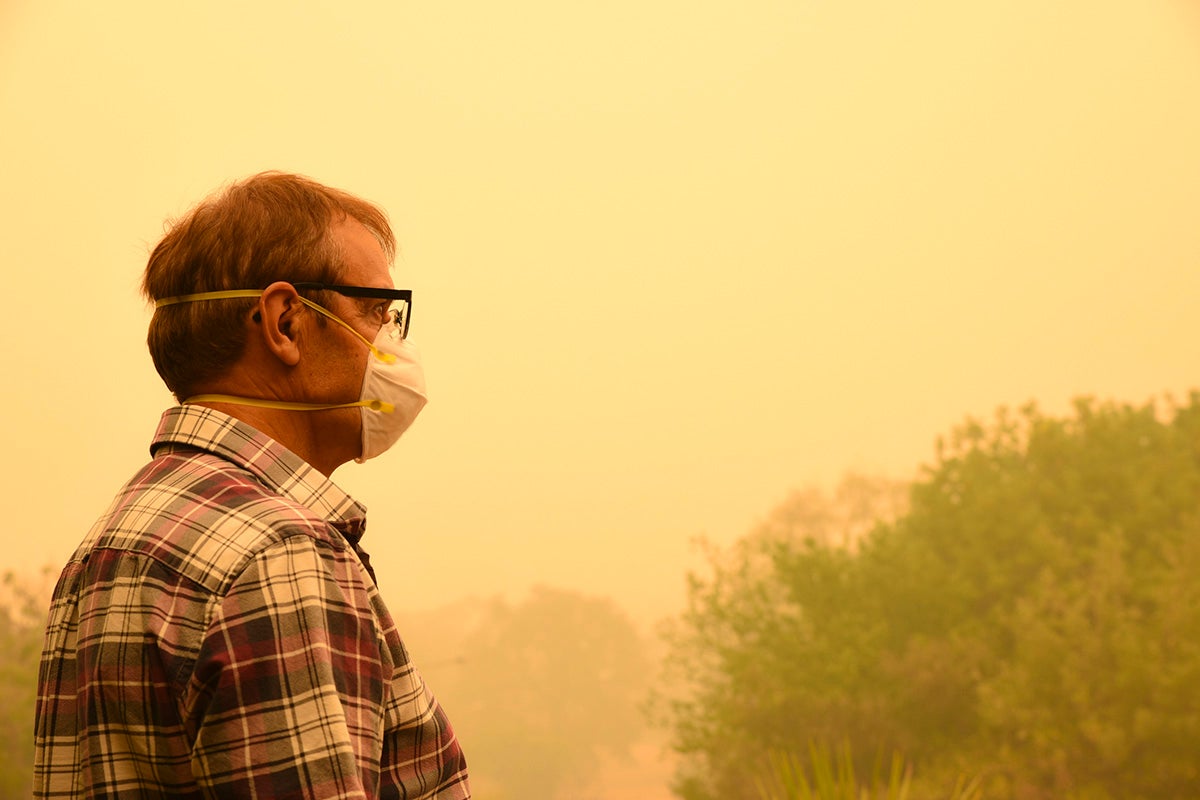Adopting electric school buses in the United States: Health and climate benefits.
Choma EF, Robinson LA, Nadeau KC.
Proc Natl Acad Sci U S A. 2024 May 28. 121(22):e2320338121. PMID: 38768355
Dr. Kari Nadeau is the Chair of the Department of Environmental Health at Harvard School of Public Health and John Rock Professor of Climate and Population Studies. She practices Allergy, Asthma, Immunology in children and adults. She has published over 400+ papers, many in the field of climate change and health. Dr. Nadeau, with a team of individuals and patients and families, has been able to help major progress and impact in the clinical fields of immunology, infection, asthma and allergy. Dr. Nadeau is a member of the National Academy of Medicine and the U.S. EPA Children's Health Protection Committee.
For more than 30 years, she has devoted herself to understanding how environmental and genetic factors affect the risk of developing allergies and asthma, especially wildfire-induced air pollution. Her laboratory has been studying air pollution and wildfire effects on children and adults, including wildland firefighters. Many of the health issues involving individuals and the public are increasing because of global warming, sustainability practices, and extreme weather conditions. She oversees a team working on air pollution and wildfire research along with a multidisciplinary group of community leaders, firefighters, engineers, scientists, lawyers, and policy makers. Dr. Nadeau was appointed as a member of the U.S. Federal Wildfire Commission in 2022.
Dr. Nadeau works with other organizations and institutes across the world. She is working with the WHO on a scoping review and report for health ministers and policy makers on wildland fires: how to mitigate, adapt, and follow UN SDG's to create resiliency and co-benefits in communities, especially LMICs.
She also launched four biotech companies, and founded the Climate Change and Health Equity Task Force and started the Sustainability Health Seed Grant initiative and Climate Change and Health Fellowship program at Stanford. She also developed climate change and health courses at Stanford.
She also has served on the Scientific Advisory Board of the U.S. EPA.
Dr. Nadeau earned her MD/PhD from Harvard Medical School in 1995, completing her doctoral work in biochemistry and immunology, followed by a pediatric internship and residency at Boston Children's Hospital (1995-1997). She moved to California for a fellowship in the Stanford-UCSF Allergy, Asthma, and Immunology Program (2003-2006), joining the Stanford Medical School faculty as an instructor, followed by promotions to assistant professor (2008), associate professor (2011), and professor (2015).
Choma EF, Robinson LA, Nadeau KC.
Proc Natl Acad Sci U S A. 2024 May 28. 121(22):e2320338121. PMID: 38768355
Dresser C, Mahalingaiah S, Nadeau KC.
JAMA Netw Open. 2024 May 01. 7(5):e2412026. PMID: 38787564
Leap SR, Soled DR, Sampath V, Nadeau KC.
Ann Allergy Asthma Immunol. 2024 Jul. 133(1):20-27. PMID: 38648975
Horne BD, Johnson MM, Blagev DP, Haddad F, Knowlton KU, Bride D, Bair TL, Joy EA, Nadeau KC.
CHEST Pulm. 2024 Jun. 2(2). PMID: 38993972
Zhou X, Sampath V, Nadeau KC.
Ann Allergy Asthma Immunol. 2024 Apr. 132(4):426-432. PMID: 38253122
Ozonoff A, Jayavelu ND, Liu S, Melamed E, Milliren CE, Qi J, Geng LN, McComsey GA, Cairns CB, Baden LR, Schaenman J, Shaw AC, Samaha H, Seyfert-Margolis V, Krammer F, Rosen LB, Steen H, Syphurs C, Dandekar R, Shannon CP, Sekaly RP, Ehrlich LIR, Corry DB, Kheradmand F, Atkinson MA, Brakenridge SC, Higuita NIA, Metcalf JP, Hough CL, Messer WB, Pulendran B, Nadeau KC, Davis MM, Sesma AF, Simon V, van Bakel H, Kim-Schulze S, Hafler DA, Levy O, Kraft M, Bime C, Haddad EK, Calfee CS, Erle DJ, Langelier CR, Eckalbar W, Bosinger SE, Peters B, Kleinstein SH, Reed EF, Augustine AD, Diray-Arce J, Maecker HT, Altman MC, Montgomery RR, Becker PM, Rouphael N.
Nat Commun. 2024 Jan 03. 15(1):216. PMID: 38172101
Ozonoff A, Schaenman J, Jayavelu ND, Milliren CE, Calfee CS, Cairns CB, Kraft M, Baden LR, Shaw AC, Krammer F, van Bakel H, Esserman DA, Liu S, Sesma AF, Simon V, Hafler DA, Montgomery RR, Kleinstein SH, Levy O, Bime C, Haddad EK, Erle DJ, Pulendran B, Nadeau KC, Davis MM, Hough CL, Messer WB, Agudelo Higuita NI, Metcalf JP, Atkinson MA, Brakenridge SC, Corry D, Kheradmand F, Ehrlich LIR, Melamed E, McComsey GA, Sekaly R, Diray-Arce J, Peters B, Augustine AD, Reed EF, Altman MC, Becker PM, Rouphael N.
EBioMedicine. 2023 Dec. 98:104860. PMID: 37918220
Zetlen HL, Cao KT, Schichlein KD, Knight N, Maecker HT, Nadeau KC, Rebuli ME, Rice MB.
J Immunol Methods. 2023 06. 517:113473. PMID: 37059295
Sampath V, Shalakhti O, Veidis E, Efobi JAI, Shamji MH, Agache I, Skevaki C, Renz H, Nadeau KC.
Allergy. 2023 08. 78(8):2109-2120. PMID: 36883412
Gao F, Mallajosyula V, Arunachalam PS, van der Ploeg K, Manohar M, Röltgen K, Yang F, Wirz O, Hoh R, Haraguchi E, Lee JY, Willis R, Ramachandiran V, Li J, Kathuria KR, Li C, Lee AS, Shah MM, Sindher SB, Gonzalez J, Altman JD, Wang TT, Boyd SD, Pulendran B, Jagannathan P, Nadeau KC, Davis MM.
Immunity. 2023 04 11. 56(4):864-878.e4. PMID: 36996809
As climate change continues to escalate, protecting maternal and infant health must be a priority, according to experts from Harvard Chan School.

Replacing diesel school buses with electric school buses may yield up to $247,600 in climate and health benefits per individual bus, according to a new study led by Harvard Chan School.

People living in U.S. households with gas stoves may regularly breathe in unsafe levels of nitrogen dioxide, according to a new study co-authored by Harvard Chan School’s Kari Nadeau.

A symposium at Harvard Chan School brought together academics, community leaders, activists, mindfulness practitioners, and monastics who studied under Thich Nhat Hanh to explore the intersection of health, mindfulness, and climate change.

Diseases related to problems in immune health—from nasal allergies to food allergies to rheumatoid arthritis to colorectal cancer—have spiked in recent years, and climate change appears to be playing a role, according to Harvard Chan School’s Kari Nadeau.
